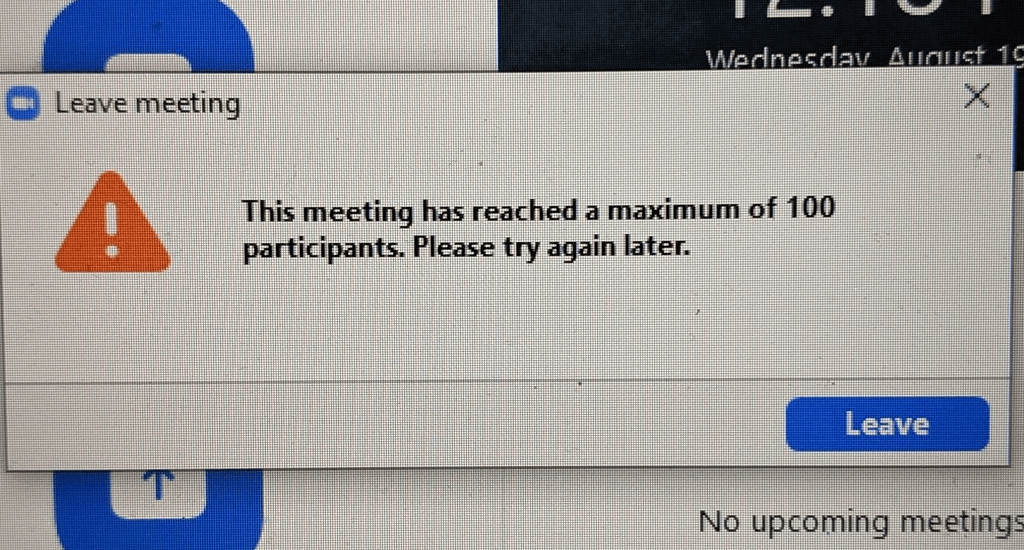Shaun Kenney | Republican Standard
Former Speaker Kirk Cox: “…an unprecedented and unjustified power grab unlike anything I have seen during my 31-years as a Delegate.
Delegate Glenn Davis (R-Virginia Beach) was greeted with this notification as he attempted to log on for virtual voting:

Whoops!
Garren Shipley with the House Republican Caucus was more direct:
Right now a member could be muted, attempting to get the Speaker’s attention and be ignored. The press and public would have no idea.
What’s the saying, “Democracy dies in darkness?”
— Garren Shipley (@GarrenShipley) August 19, 2020
Former Speaker Kirk Cox (R-Colonial Heights) raised the flag the highest and longest about what could only be described as a minor revolution in the House of Delegates, one that completely undermines the idea of representative government:
“For those who may not have followed it closely, here is what happened. The Democratic majority attempted to change the rules of the House of Delegates to allow for virtual legislative meetings and voting, but did not earn a sufficient number of votes to do so immediately. When that failed, they attempted to suspend the rules for a temporary period, allowing virtual legislative meetings and voting to proceed while awaiting a formal rules change. When that effort failed, they simply disregarded the rules and through some abnormal resolution conferred unilateral power upon the Speaker to direct committees to meet and vote virtually whenever she so chooses.
Delegate Tony Wilt (R-Broadway) went into more depth about what the House Democrats actually engineered:
“The Democratic majority attempted to change the House rules to allow committees and the full body to meet entirely online. After two failed attempts at a rule change to allow for virtual session, they decided to ignore the rules and forced through a resolution on a simple majority vote (party line) that gives sole authority to the Speaker to declare by fiat that the House shall meet virtually. To add insult to injury, next they passed a resolution that authorizes per diem payments for the special session. This amounts to just over $200 a day that is supposed to go towards food, travel and lodging expenses. However, with a virtual session these travel expenses do not exist! A legislator can literally participate from their living room if they wish and collect the per diem. During a time of economic crisis when cuts will undoubtedly need to be made, this is wrong. This amounts to a complete waste and improper use of taxpayer dollars.
The media isn’t talking about this. More is the pity, because this Orwellian move to governing-by-couch is precisely what governing in the dark represents.
Now bear in mind that the House Democrats voted themselves their full $212 per diem to sit in their pajamas and govern on the couch. Tough gig, isn’t it?
But let’s review what this actually is in practice:
-
Citizens can no longer directly lobby their legislators.
-
Legislators are no longer required to come to Richmond.
-
Committees and subcommittees will now be almost exclusively governed by what the respective chairs determine regardless of technical issues or dissension among other members.
-
Legislators are further rewarded for continuing the “long parliament” at $212/day, a healthy share of the government spoils system during a state-imposed economic lockdown.
In short, if Madam Speaker needs a bill passed? You submit the bill (in the dark), pop the bill into the hopper (in the dark), have the committee chair ram in through (in the dark) and hope it survives first and second reading while silencing any opposition through technical snafus.
By way of the RTD’s Jeff Schapiro, there is an excellent op-ed from David Brooks that discusses how radicals rarely win, and are therefore forced to rely upon the Burkeans to make it work — in short, a reliance on that old tried and true tradition we call process:
Radicals are not good at producing change because while they are good at shaking up the culture, they don’t have practical strategies to pass legislation when you have to get the support of 50% plus one.
The people who come in their wake and actually make change are conservative radicals. They believe in many of the radicals’ goals, but know how to work within the democratic framework to achieve them.
Conservative radicals, like Hamilton, Lincoln and Roosevelt, begin with moderate dispositions. They have a reverence for the collective wisdom of the past. They have an awareness that the veneer of civilization is thin and if you simply start breaking things you get nihilism, not progress.
Of course, David Brooks is talking about what he terms “the extreme right wing of the left wing” and so forth — caveat lector and all that. Yet one can see the point Brooks is making to his erstwhile (and newfound) allies on the political left. Craziness begets reaction; reaction stymies progress.
What the House Democrats are doing isn’t just crazy, it’s positively Orwellian. More than this, it is the antithesis of governance in the light of day that is the predicate of representative government.
At no time in Virginia’s history have we allowed our legislators to govern in a papal conclave. Through smallpox or yellow fever or polio, whether the advance was the telephone or the computer, Virginia always managed to do the people’s business in person.
What has changed? Certainly not the people. Perhaps it is the weakness of the agenda that knows it will not survive public scrutiny? If this is the case, then perhaps Democrat would be better served to air on the side of pragmatic caution rather than listening to the siren song of Biden +11 — because there are rocks in those shoals, to be sure.
Of course, there is a deeper question here that House Democrats ought to consider in the ramble. Is our technocratic age really is progress? Does a layer of technology (even during a pandemic) really improve this thing we call self-government? Or does it have a corrosive effect?
In short, just because this is new technology can we really call it progress? In an era where people stare mindlessly into their smartphones endlessly entertaining themselves to death, one might think that the consideration of our laws and processes deserve a bit more depth and interaction than the devices we use to play Candy Crush Saga — yes?
Governance of the people requires personal interactions, not these 2D technocratic and false exchanges over fiber optics. That’s the catch, and if it means we do this with masks on our faces at distances of six feet? So be it.
Or we can always go for the solution Amanda “3/5ths” Chase (I-Chesterfield, possibly Appomattox?) has forced upon the taxpayer dole.
All that’s missing here is the drum set:
Sen. Amanda Chase will have a glass box around her at the science museum where the Senate is meeting. She brought a doctor’s note saying she can’t wear a mask. pic.twitter.com/AXmUOyA4lz
— Amy Friedenberger (@AJFriedenberger) August 18, 2020
Virginians elect representatives to meet to deliberate our laws in what becomes an inherently moral process. Our lawmakers approve of moral laws, reject immoral ones, and discern between the two.
We ask them to do this among one another, not in the privacy of their own living rooms, precisely because our General Assembly is supposed to be a deliberative body, not a reflective one.
That’s the difference between governance in the light of day and governing in the dark.
House Democrats should deeply reconsider this push for progress at any cost, even at the risk of re-evaluating options. That’s always politically risky, but there’s never a wrong time to do the right thing, Madam Speaker.
Shaun Kenney is the editor of The Republican Standard, former chairman of the Board of Supervisors for Fluvanna County, and a former executive director of the Republican Party of Virginia.





